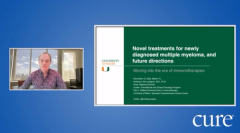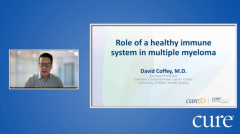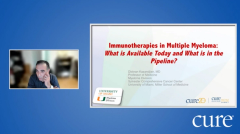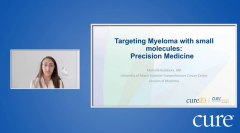
Educated Patient® Multiple Myeloma Summit Precision Medicine Presentation: November 13, 2022
Watch Dr. Marcella Kaddoura, from Miami Sylvester Comprehensive Cancer Center, discuss targeting myeloma with small molecules with precision medicine during the CURE® Educated Patient® Multiple Myeloma Summit.
Episodes in this series

Targeting the specific aspects of patients’ biology that drive their cancer, also known as precision medicine, can improve outcomes for patients with myeloma and improve quality of life by decreasing the severity of side effects, explained Dr. Marcella Kaddoura.
At a recent CURE® Educated Patient® Multiple Myeloma Summit, Kaddoura, from Miami Sylvester Comprehensive Cancer Center in Florida, discussed how the complex nature of genomics in multiple myeloma makes the disease an ideal candidate for precision medicine. She also expanded on the specific therapeutic targets currently being studied in multiple myeloma.
In a recent interview with CURE®, Kaddoura urged patients with multiple myeloma to consider the benefits of this targeted approach, stating, “all patients at any disease stage should benefit from (precision medicine).”
Understanding Precision Medicine
Unlike traditional chemotherapy treatments, which destroy both healthy and cancerous cells, precision medicine targets the patients’ driver mutations, which are the changes in the DNA sequence of genes that cause cells to become cancerous.
According to Kaddoura, this approach allows the cancerous cells to be destroyed and spares the benign cells, greatly decreasing the toxic side effects faced by patients and allowing them to have improved quality of life while undergoing treatment.
She went on to explain this approach is also more effective at destroying malignant cells because it is designed to be specific to a patient’s biology.
Implementing Precision Medicine for Patients With Myeloma
Kaddoura stated that multiple myeloma, when compared to other blood cancers such as leukemia, is more complex and heterogeneous, meaning that there are multiple factors that drive myeloma.
What this means is that there is a “huge variance in the way that the disease tends to behave (and) particularly whether or not (it is) going to respond to the treatments that (oncologists) give (patients),” Kaddoura said. This provides a unique opportunity for doctors: they can find what specifically drives each patient’s myeloma and design drugs, or use drugs that already exist, to target these drivers and kill cancerous cells.
This specific approach is not without challenges, however. According to the Kaddoura, over time, the cancerous cells may start using different pathways to spread the cancer, rendering the targeted medicine ineffective and leading to disease progression.
To stay ahead of this issue, Kaddoura explained that clinicians must remain vigilant and “check for drivers throughout the disease course, as the disease biology can change over time.”
Therapeutic Targets in Myeloma
Kaddoura illustrated specific myeloma-causing drivers that are currently being investigated: the RAS/RAF/MAPK pathway, which activates specific genes that facilitate cell growth; the membrane attack complex (MAC) pathway, which stops cells from dying; and the mTOR pathway, which activates the mammalian target of rapamycin (a protein that can accelerate cancer growth).
Kaddoura cited Zelboraf (vemurafenib) and Tafinlar (dabrafenib) as drugs that target these pathways and claimed that 33% of patients responded to these medications.
She added that BCL-2 is a gene that regulates cell death. When too much BCL-2 is expressed in the body, cell death is blocked and cancer cells build up in the body. Venclexta (venetoclax) can prevent the BCL-2 from impeding cell death, causing cancerous cells to die. In fact, Kaddoura emphasized that Venclexta is “the most successful targeted therapy in myeloma to date.”
Myeloma Clinical Trials Are Crucial
Kaddoura stressed the best way to advance precision medicine is through patient enrollment in clinical trials, urging patients to explore their options with their medical team.
Patients who may be hesitant over the novel nature of these treatments should still consider participating in trials “because (precision medicine) is so precise to the tumor’s biology, it tends to have less of a toxic effect on the normal surrounding cells, (and they) tend to be very effective.”
Kaddoura emphasized that she is optimistic for the future of precision medicine, and that patients “should be excited (for what is to come). This is a very exciting field.”
“We can turn a disease that used to be thought of almost as a death sentence (into a cure using precision medicine), and they can live normal lives,” Kaddoura concluded, “We hope to do that in myeloma one day.”
For more news on cancer updates, research and education, don’t forget to














